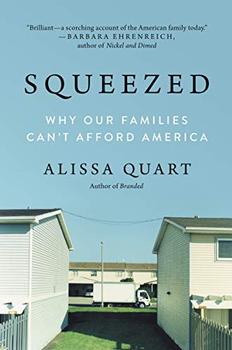Summary | Excerpt | Reading Guide | Reviews | Beyond the Book | Read-Alikes | Genres & Themes | Author Bio

Why Our Families Can't Afford America
by Alissa QuartThis article relates to Squeezed
Author Alissa Quart argues in her book Squeezed, that a Universal Basic Income is one possible solution for job insecurity, particularly for stay-at-home parents and domestic workers who are often shut out of the economy and for workers whose jobs may be phased out due to automation.
But what exactly is UBI? Basically, it's a program that distributes a fixed income to everyone, regardless of employment. While there are some questions as to how it should be implemented, one estimate suggests it would cost the United States up to $3.2 trillion to distribute $10,000 checks annually to every adult citizen or $1.5 trillion if means-tested to exclude those who don't need it (by comparison the National Health Expenditures in 2016 was $3.3 trillion in 2016). Funding would likely come from carbon and income taxes, a decrease in military spending, and other similar revenue-raising means.
UBI has a fair number of supporters including Elon Musk, Matt Bruenig of the progressive think tank Demos, and, ironically, the late president Richard Nixon who tried but failed to launch a similar program during his administration. However the program also has its critics. They believe UBI could harm workers by eliminating welfare programs, lowering wages, or curbing people's need for work.
It's tough to get a real assessment on whether UBI will help or hurt workers since no country has established a fully-functioning program. However, smaller scale models have offered some clues. One model, launched in 2017 in Finland, planned to distribute €560 euros (US$675) to 2,000 randomly selected recipients for two years. The program was largely designed to determine the effect universal incomes would have on the labor market.
Unfortunately UBI supporters claimed it was insufficient because it was too small in scale and duration to be applicable and was never fully supported by the ruling conservative party. Researchers were told to monitor the recipients' willingness to work, contradicting the no-strings attached nature of UBI. Concurrently a welfare reform package was rolled out by the Centre Party, delaying unemployment benefits to the chronically unemployed (half of the beneficiaries lost benefits so far). After one year, the government suspended the program, pending final review in 2019.
Other regions, however, have yielded far better results. For instance, a small village in Namibia became the site of a pilot program, The Basic Income Grant Coalition. Supported by NGOs, church groups and labor unions, the grant distributed N$100 per person under 60 years of age in monthly installments. Since its launch in 2008, the area has seen a steady decline in malnutrition, poverty and crime rates, and a 29% increase in the average earned income.
In Alaska, a version of UBI has paid out annual dividends since its inception in 1982. Called the Permanent Fund Dividend (PFD), a diverse portfolio made up of revenue collected from oil and mineral leases, it has distributed annual dividends to each permanent resident of Alaska (both adults and children, with the exception of convicted and incarcerated individuals) ranging from a low of $331 in 1984 to a high of over $2072 in 2015. While still too low to constitute sustainable income, PFD has answered some concerns about UBI. Contrary to speculations about its effect on the labor market, researchers from the University of Chicago have shown that the payments haven't changed full-time employment rates in Alaska and estimates an increase of 17% in part-time work. PFD is also popular among Alaskans (71%), even when a possible increase of taxes are factored in.
UBI continues to gather steam. Other countries like Canada, the Netherlands, Scotland, and Iran are implementing or studying the possibility of pilot programs, with U.S. cities like Stockton and Oakland also implementing or discussing pilot programs either through public or private grants.
Filed under Society and Politics
![]() This "beyond the book article" relates to Squeezed. It originally ran in August 2018 and has been updated for the
May 2019 paperback edition.
Go to magazine.
This "beyond the book article" relates to Squeezed. It originally ran in August 2018 and has been updated for the
May 2019 paperback edition.
Go to magazine.
Your guide toexceptional books
BookBrowse seeks out and recommends the best in contemporary fiction and nonfiction—books that not only engage and entertain but also deepen our understanding of ourselves and the world around us.